How do Kenyan coffee beans taste good? Characteristics of flavor and taste in coffee producing areas of Kenya
Qianjie Coffee spent a long time introducing to you a lot of information and stories about Ethiopian coffee. I believe that if you have read the article in Qianjie seriously, you should know something about the coffee producing areas and varieties of Ethiopia. But Africa is not only good coffee in Ethiopia, today Qianjie will lead you to the south to learn about Kenyan coffee. You know, Kenyan AA coffee beans are recognized as one of the best in the world. First, let's introduce Kenyan coffee from a historical and geographical point of view.
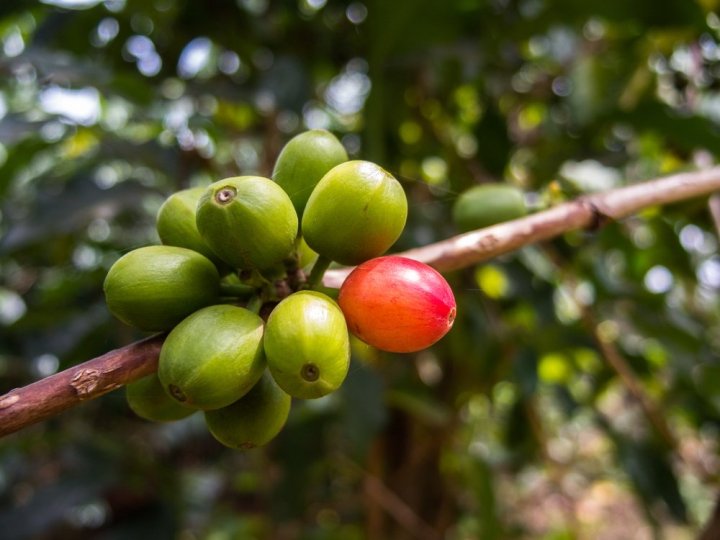
Kenyan coffee started much later than Ethiopia, which entered Kenya in the 19th century, when Ethiopian coffee drinks were imported to Kenya through southern Yemen. But it was not until the early 20th century that the Bourbon Coffee Tree was created by the St. Austen Mission (St). Austin Mission) is introduced. Coffee production began at the beginning of the 20th century. Since then, Kenya has become the 21st largest coffee producer in the world. The industry produces more than 51 million kilograms of coffee a year and employs more than 6 million people.
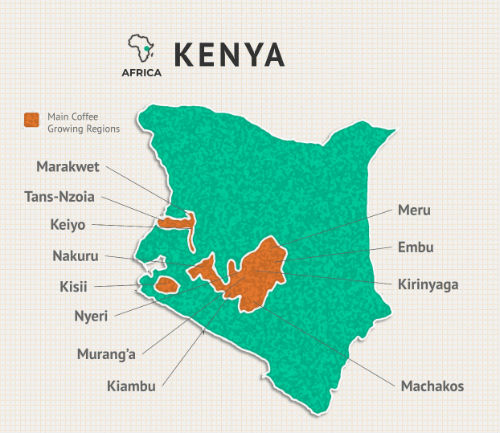
Most Kenyan coffee is grown in the highlands between the mountains of Kenya in the north and the city of Nairobi in the southwest. The fertile volcanic soil in the area is very suitable for growing coffee trees. In addition, high altitude, warm climate and adequate rainfall are factors contributing to the ideal growth conditions of Kenyan coffee.
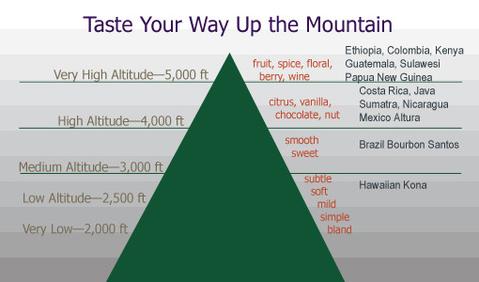
Kenyan coffee is mostly grown at an altitude of 1500m, 2100m, and is harvested twice a year. To ensure that only ripe berries are picked, people must tour the forest about seven times. The cultivation of coffee in Kenya is lost, similar to Ethiopia, where coffee is grown by small farmers. After they harvest the coffee, they first send the fresh coffee beans to the cooperative cleaning station. The washing station sends the dried coffee to the cooperative in the form of "parchment coffee beans" (i.e. coffee beans covered with endocarp) ("parchment coffee beans" is the last state of coffee beans before peeling). All the coffees are collected together, and growers charge an average price according to their actual quality. This trading method generally works well and is fair to both growers and consumers.
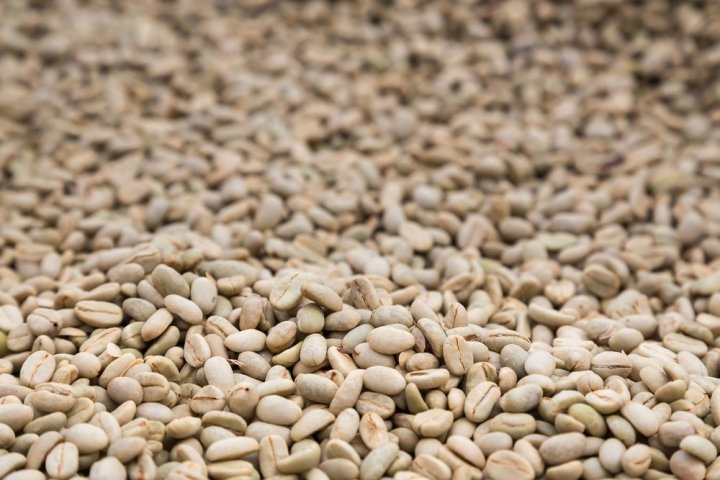
Kenya is a model country for producing fine coffee beans. Kenya produces high-altitude Arabica water-washed beans, which are the top coffee beans in the world. Most coffee beans are graded by the Kenya Coffee Bureau and sold at auctions. Kenya Coffee Agency is strict in coffee research, development and quality management, and through an excellent auction system to raise coffee prices to help poor coffee farmers. And through agricultural education to continuously update and improve the planting technology of coffee farmers, and further produce better coffee. These coffee bean bags marked with [AA] represent top quality. The quality of Kenyan coffee beans is proportional to the price and is very stable. Kenya coffee with BlackBerry fruit flavor produces very little. These coffee beans are derived from fine coffee farms established by foreign companies in Kenya or fine coffee farms acquired by Kenyan companies, which are the targets of many coffee bean companies.
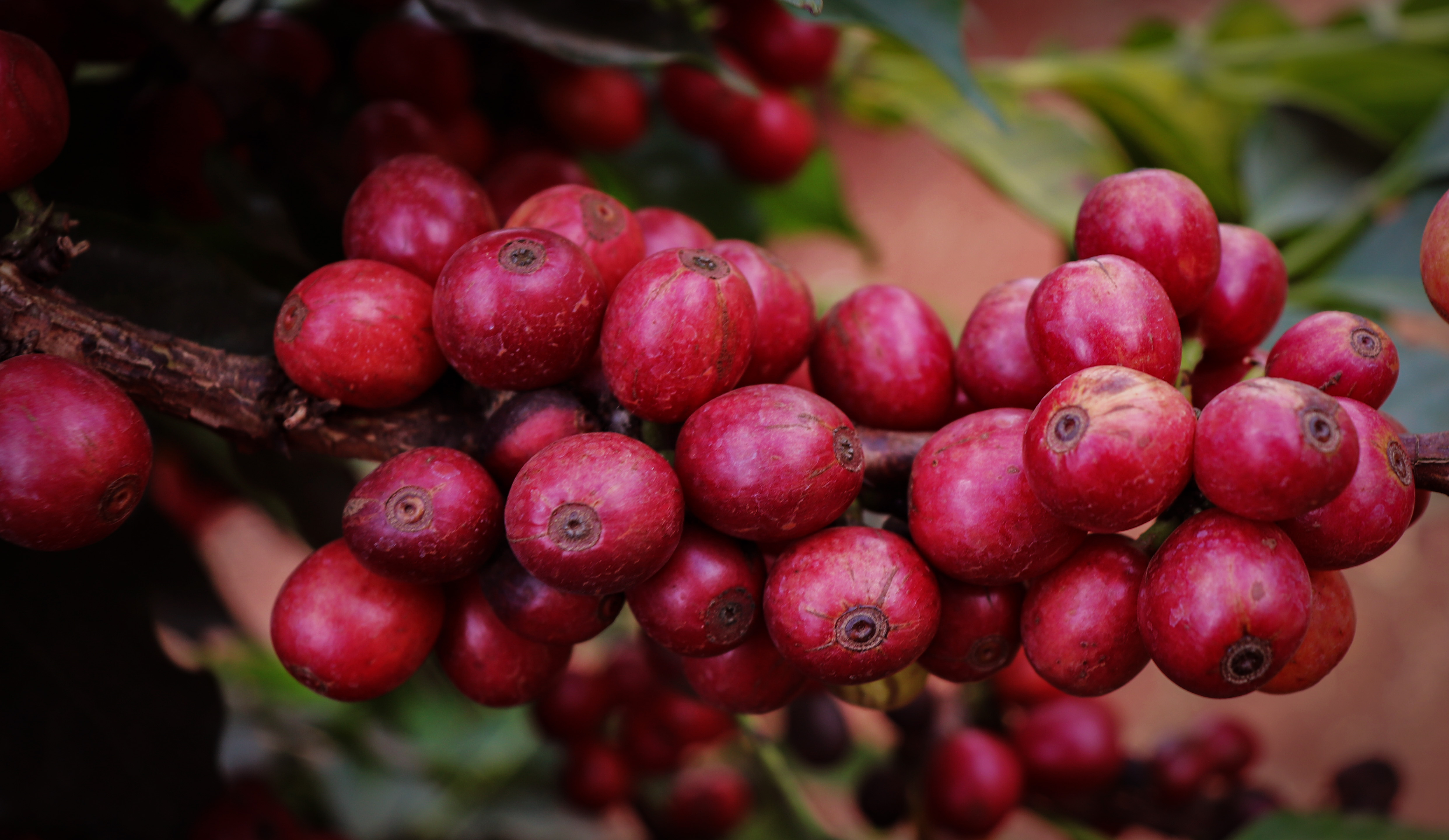
Qianjie believes that another aspect of why Kenyan coffee has such excellent quality is that the Kenyan government takes the coffee industry very seriously. In Kenya, it is illegal to cut down or destroy coffee trees. Kenyan coffee buyers are world-class buyers of premium coffee, and no country can grow, produce and sell coffee on a continuous basis like Kenya. All coffee beans are first acquired by the Kenya Coffee Commission (coffeeBoard of Kaeya, CBK), where they are identified, graded, and then sold at weekly auctions, where they are no longer graded. The Kenya Coffee Commission only acts as an agent to collect coffee samples and distribute them to buyers so that they can determine the price and quality. The auction in Nairobi is for private exporters, and the Kenya Coffee Commission pays growers a price below the market price. The best coffee grade is bean berry coffee (PB), followed by AA++, AA+, AA, AB and so on. The fine coffee is shiny, delicious and slightly alcoholic.
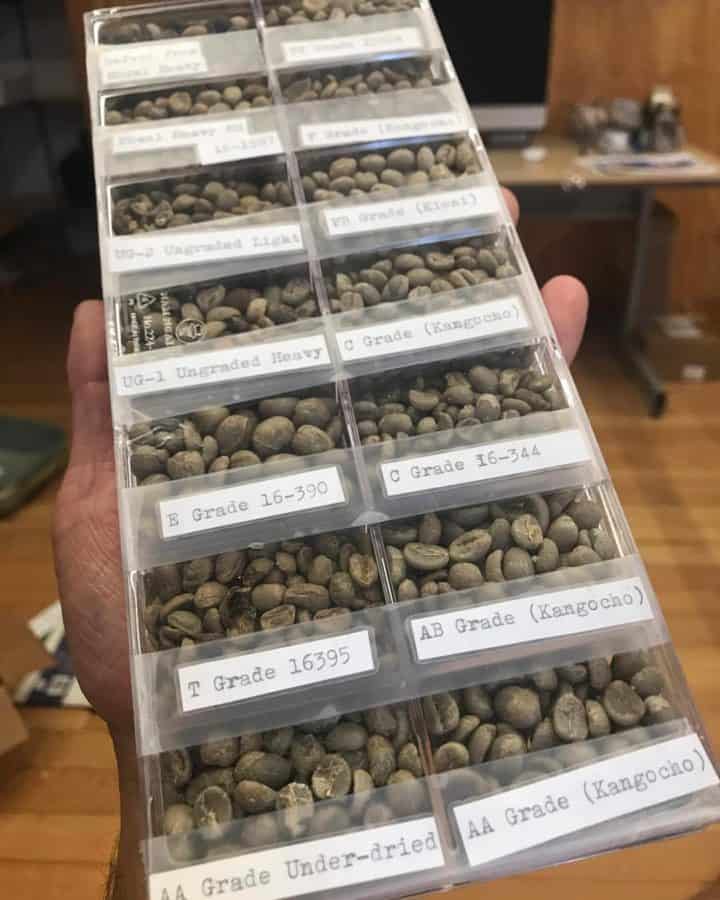
Auctions are also organized to meet the needs of dispatchers. This kind of auction usually has a small auction volume (6 tons per case), with samples with the grower's logo for buyers to enjoy. After the auction, the exporters pack according to different flavors, different qualities and the quantity required by the blenders. This provides a great deal of flexibility for the dispatcher. Quality-conscious Germans and Scandinavians are long-term buyers of Kenyan coffee.
The rare good coffee ── is famous for its rich aroma and balanced acidity.
Qianjie believes that if you like the bright and lively flavor of coffee, then Kenya coffee beans you must not miss. This is because Kenyan coffee contains every feeling that Qianjie wants from a good cup of coffee. It has wonderful and satisfying aromas, well-balanced acidity, well-proportioned particles and excellent fruit flavors. Qianjie believes that the harmonious flavor is related to Kenya's most famous K72 water washing treatment, in addition to the phosphoric acid-rich local soil in Kenya. The legendary K72 washing process is in the harvest of coffee cherries, peeling and fermenting, brewing with water 24 hours after the hairpin. Continue to soak the clean coffee fruit in water to ferment for 24 hours and rinse with water for 24 hours. this repetition can achieve strong fermentation after 72 hours, making the flavor of Kenyan washed coffee particularly bright. Generally speaking, Qianjie uses a light baking degree to retain the unique fruit flavor of Kenyan coffee. Because the baking degree is not deep, it is very suitable for the eosinophilic group.
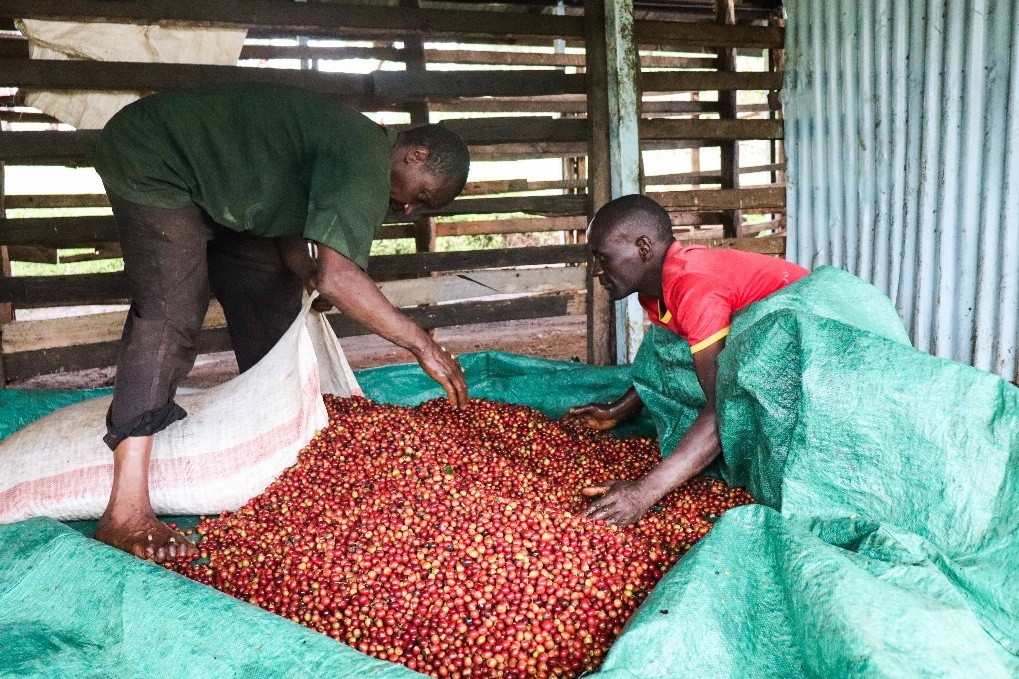
Next, we will brew a Kenyan coffee bean on the front street. The raw bean information of the coffee is as follows:
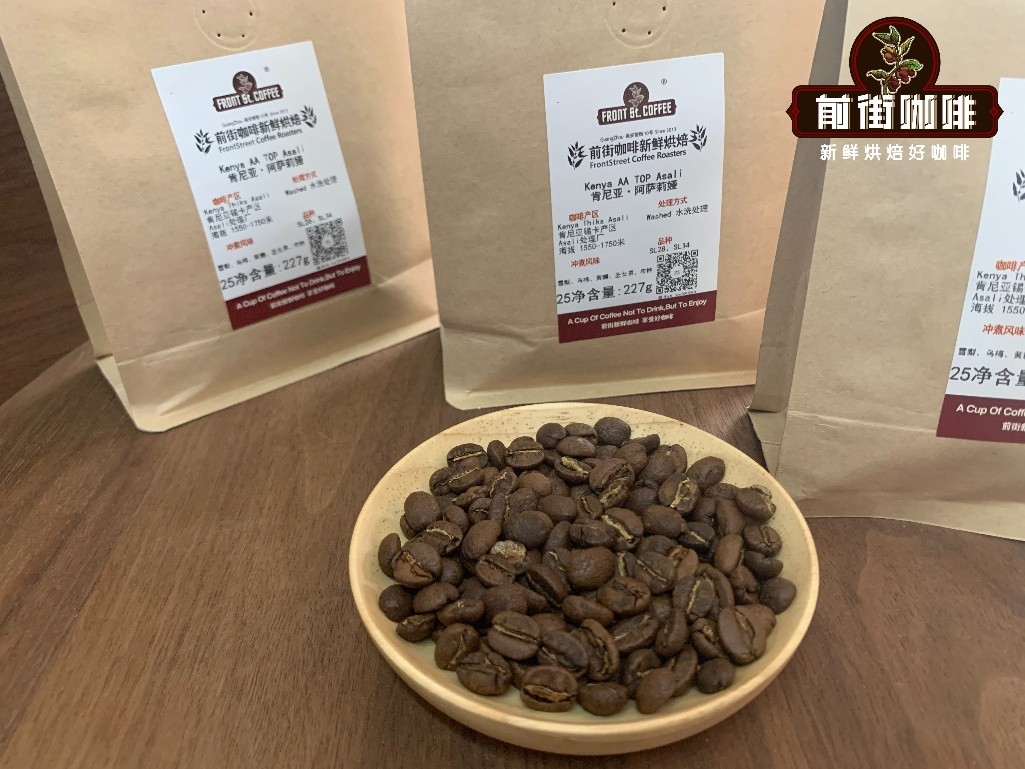
Asaria AA TOP, Kenya, refined water washing for 72 hours
Country: Kenya
Producing area: Sika
Processing plant: Asali honey processing plant
Altitude: 1550-1750 m
Soil: volcanic soil
Rating: AA TOP
Varieties: SL28, SL34
Treatment method: 72 hours washing treatment
Qianjie Coffee recommends Kenyan coffee brewing parameters:
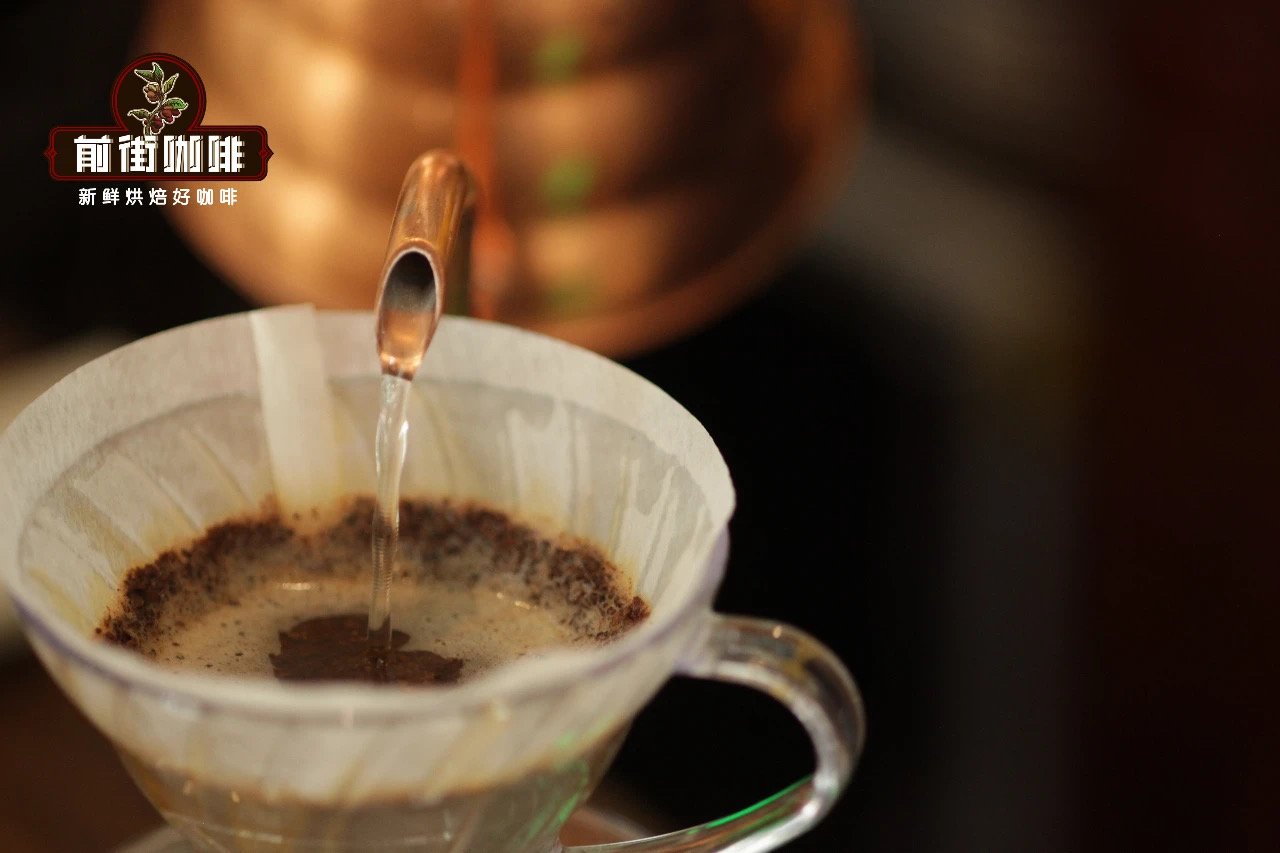
V60 filter cup
Water temperature 91 ℃
Ratio of gouache to flour at 1:15
Powder content 15g
Degree of grinding (China 20 standard screen pass rate of 80%)
Kenya coffee how to brew: with 30 grams of water for 30 seconds, small water injection around the circle to 125 grams for segments, water level drop is about to expose the powder bed, continue to water injection to 225 grams to stop water injection, such as the water level drop is about to expose the powder bed to remove the filter cup, (steaming start timing) extraction time is 2 minutes 390 percent ".
Kenyan coffee features taste: Qianjie thinks the acidity is very lively. When the entrance is full of caramel flavor, when the temperature drops, it will have the unique taste of black plum, and the acidity is more inclined to lemon. The tail rhyme will have the sweetness of a small tomato, and the whole is clean.
Professional coffee knowledge exchange more coffee bean information please follow the coffee workshop (Wechat official account cafe_style)
For more boutique coffee beans, please add private Qianjie coffee on Wechat. WeChat account: kaixinguoguo0925
Important Notice :
前街咖啡 FrontStreet Coffee has moved to new addredd:
FrontStreet Coffee Address: 315,Donghua East Road,GuangZhou
Tel:020 38364473
- Prev

Time-limited discount, don't miss it again! Let's go! Manning 9.9 yuan, Brazil 9.9 yuan, 29.9 yuan
Professional coffee knowledge exchange more coffee bean information please follow the coffee workshop (Wechat official account cafe_style) front street coffee, give back to fans to support Thanksgiving teacher's Day! Start the group like crazy! 2018 new production season Manning 9.9 yuan 100g! After ▼ 0iXeb31r4pf, go to Amoy ♂ Red ♀ Brazil Red Bourbon 9.9 yuan 100g! Free delivery across the country! Limit the purchase of 3 packets of ▼ per ID
- Next

How is Kenyan coffee graded? what are the characteristics of Kenyan coffee?
Professional coffee knowledge exchange more coffee bean information please follow the coffee workshop (Wechat official account cafe_style) while the coffee from Kenya has a very remarkable feature: high acidity, with a strong berry flavor. Kenyan coffee is famous for its acidity and enjoys a good reputation for its quality and industry practices. The best local coffee is colorful and full-bodied
Related
- Detailed explanation of Jadeite planting Land in Panamanian Jadeite Manor introduction to the grading system of Jadeite competitive bidding, Red bid, Green bid and Rose Summer
- Story of Coffee planting in Brenka region of Costa Rica Stonehenge Manor anaerobic heavy honey treatment of flavor mouth
- What's on the barrel of Blue Mountain Coffee beans?
- Can American coffee also pull flowers? How to use hot American style to pull out a good-looking pattern?
- Can you make a cold extract with coffee beans? What is the right proportion for cold-extracted coffee formula?
- Indonesian PWN Gold Mandrine Coffee Origin Features Flavor How to Chong? Mandolin coffee is American.
- A brief introduction to the flavor characteristics of Brazilian yellow bourbon coffee beans
- What is the effect of different water quality on the flavor of cold-extracted coffee? What kind of water is best for brewing coffee?
- Why do you think of Rose Summer whenever you mention Panamanian coffee?
- Introduction to the characteristics of authentic blue mountain coffee bean producing areas? What is the CIB Coffee Authority in Jamaica?

